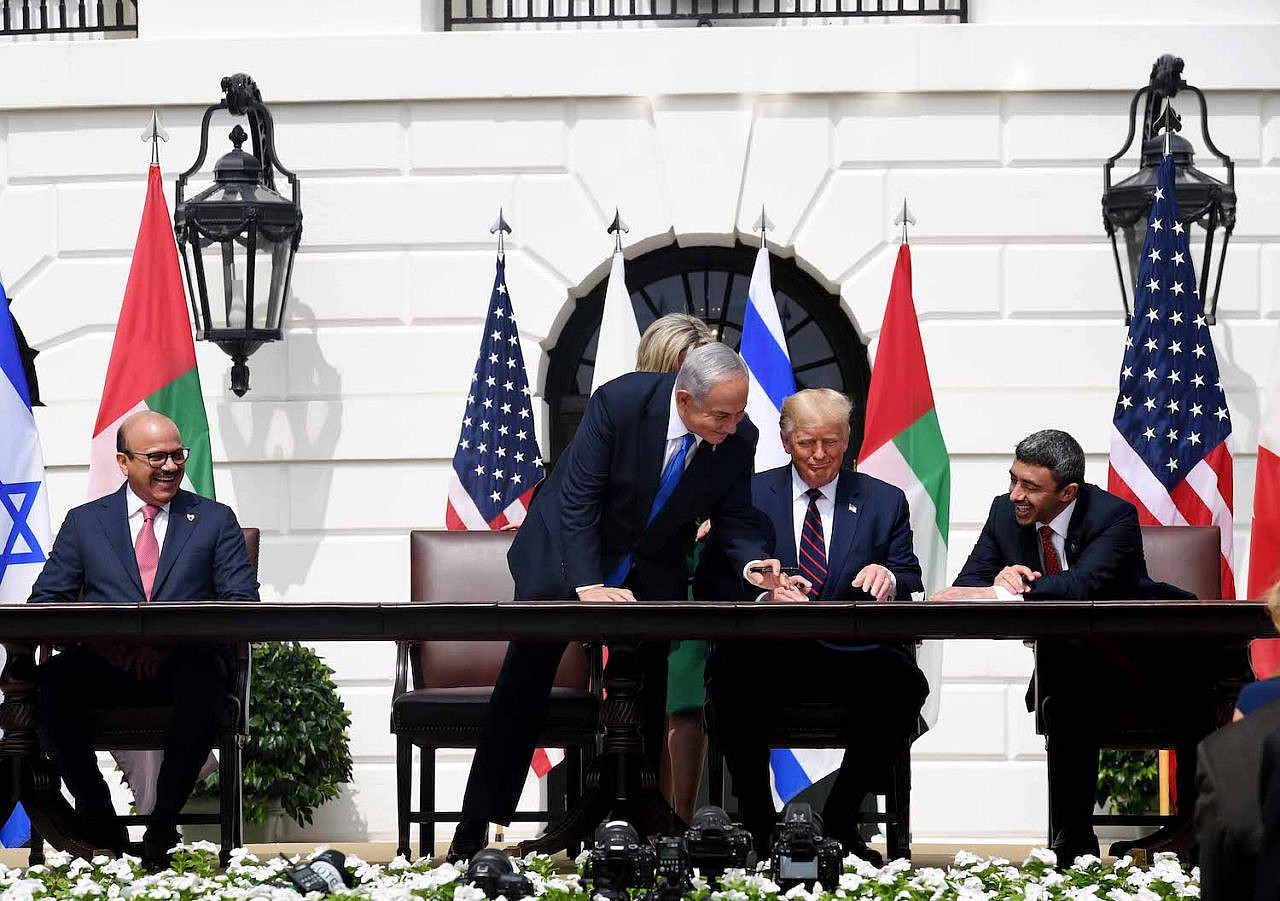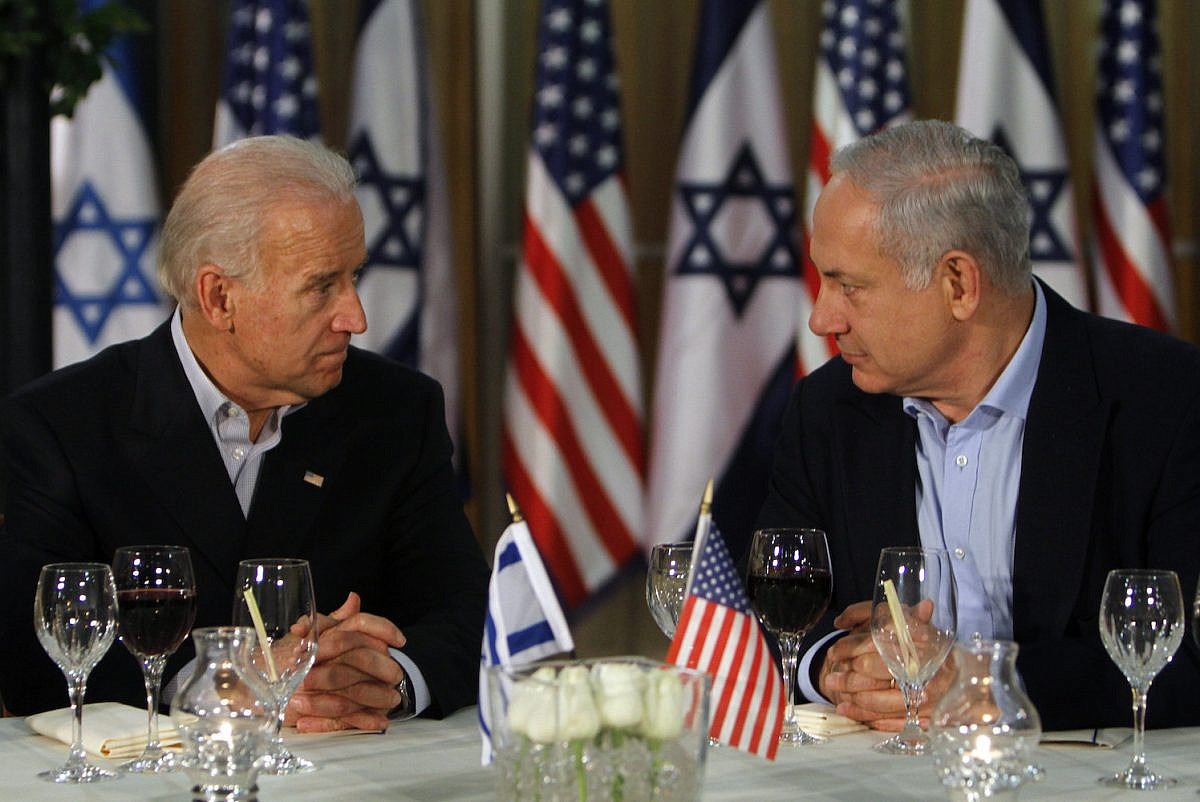Writing in Haaretz last week, Israeli security journalist Amos Harel reported that, at least in practice, the United States and Iran already have an unwritten agreement regarding the latter’s nuclear question. According to him, Iran will freeze its uranium enrichment, and in return the United States will allow the release of billions of dollars in Iranian assets across several countries, after the money was frozen as part of American sanctions. Israel, wrote Harel, has a fundamental role to play in the deal: do not disturb.
This short instruction — which we have heard often from reports about Washington’s relations with Iran and other Middle Eastern countries — might help explain a recent column by New York Times commentator Thomas Friedman, in which he claims that the White House has begun to “reassess” its relations with Israel. Days after the column was published, and after Biden met with President Isaac Herzog, Biden summoned the journalist to the White House and told him that the Netanyahu government’s plans for judicial overhaul could irreparably damage the countries’ “special relationship.”
Those who have become accustomed to headlines about the “strategic alliance” between Israel and the United States, and that Israel is the U.S.’s most important ally in the Middle East (if not the world) should, at least ostensibly, be puzzled by Friedman’s recent columns. If this alliance is so important to the U.S. government, how is it willing to reconsider it over the judicial overhaul? Or is it possible that Israel is not at all a strategic asset, but rather the exact opposite: a burden that must be kept at bay so as not interfere with American strategic moves in the region?
This theory is grounded in historical reality. When the United States organized an international coalition against Iraq after Saddam Hussein occupied Kuwait in 1991, it made every effort to keep Israel out, as it was clear that an Israeli presence would prevent Arab countries from joining. Things got to the point that even when Saddam fired missiles at Israel to provoke it to join the war, the Bush Sr. administration pressured Israel not to interfere, just as Biden is doing today with Iran.

The United States entered the Second Iraq War without a strong international coalition, but even in this situation, it did not ask Israel to provide military support. The assistance, if anything, went the other way. In 2002, Benjamin Netanyahu, then in the Knesset opposition, spoke before Congress and guaranteed U.S. lawmakers that “overthrowing Saddam will have enormous positive reverberations on the region.” In other words, that the American occupation of Iraq would help Israel, without Israel contributing to another occupation beyond its own.
One of the more famous clichés is that Israel effectively serves as an American base and aircraft carrier in the Middle East. But the truth is that the United States has placed its military bases in Saudi Arabia and Qatar — not in Israel — and likely not by accident. In fact, aside from providing intelligence and diplomatic support, it is hard to think of an American military campaign in the Middle East that Israel actively participated in.
In most cases, rather, help went in the opposite direction, with Washington mobilizing its money and influence to help Israel: from the 1979 peace agreement with Egypt, which the U.S. effectively “financed” through annual military aid to Egypt, to the recent Abraham Accords, which the U.S. also facilitated by agreeing to sell advanced military aircraft to the United Arab Emirates or through the recognition of Morocco’s occupation of Western Sahara.
Most read on +972
This does not mean that the United States does not profit from its relationship with Israel. Israel still serves as a laboratory for testing weapons and surveillance technologies that the U.S., among many countries, greatly benefit from. Moreover, most of the $3.8 billion sent to Israel every year is used for purchasing American arms.
Shared values of yesterday
Still, the explanation for the U.S.-Israel “special relationship” cannot be found only in the realms of strategy or military maneuvering. They are based, first and foremost, on the perception of what is commonly called “shared values.” Some of this derives from the Israel lobby, which bases much of its strength on the political power of the American Jewish community, and some from Christian Zionism, which has existed in the United States since the 19th century and remains a potent force in evangelical circles today.
But beyond that, the fact that Israel is described as “the only democracy in the Middle East” has a decisive weight in this sense of kinship. Israel is seen as a beacon of liberal Western values amid an oppressive and religious Middle East; it is a narrative that sets apart Israel from America’s more blatantly authoritarian, yet no less central, allies in the region, and as such it must be protected and aided in every possible way. Most of this support is not necessarily related to military aid: from pressuring Saudi Arabia to enter the Abraham Accords to vetoing UN Security Council resolutions, the political field remains the arena in which U.S. alignment is most essential to Israel.
Therefore, when the Biden administration reportedly whispers to Thomas Friedman about a “reassessment,” it means a reevaluation of Israel’s virtue as “the only democracy in the Middle East,” not because of its strategic asset.

Of course, to anyone who knows the Israeli occupation, and the myriad ways in which it has dispossessed and discriminated against Palestinians since 1948, the reference to Israel as a democracy sounds ridiculous — vacuous words that try to cover up a violent, cruel reality. But what is suddenly undermining Washington’s perception of Israel as a democratic paradise in a jungle of backwardness?
One reason is the presence of far-right politicians like Bezalel Smotrich and Itamar Ben Gvir in top ministerial positions. In practice, the Biden administration could continue reconciling the contradiction between Israel as an occupying, settler state and its self definition as a “democracy,” pretending that the occupation is a temporary bug rather than a feature, and that Israel will return to being a “Jewish and democratic” state once military rule over the Palestinians comes to an end.
Yet the behavior of Smotrich, Ben Gvir, and their allies — from policies to establish new outposts, to accelerating the expansion of existing settlements, to giving full backing to settler pogroms, to proposed authoritarian laws — is causing the illusion to crumble. It is near-impossible for anyone to pretend that there is any separation between democratic Israel and occupying Israel, when the government is clearly implementing Smotrich’s infamous “Decisive Plan.”

The disregard for the deepening apartheid in the occupied territories can also be explained by the fact that this oppression was applied against Palestinian Arabs rather than, say, Europeans. With Israel perceived, among both Republicans and Democrats, as the frontline between the West and the East, between the First and the Third World, between Judeo-Christian culture and Islam, it is easy for American politicians to view the violence against the Palestinians as an inevitable extension of the U.S.’s War on Terror, of which Netanyahu was an early prophet.
The new fault line
Now, however, it seems that the Biden administration views the right’s judicial overhaul as an effort to eliminate Israeli democracy from within — and as such, erasing what it considers the central foundation of the relationship between the two countries. Otherwise, it is difficult to explain the zeal with which both President Biden and U.S. Ambassador Tom Nides have spoken up to try to stop the overhaul, which is, on its face, an internal Israeli matter.
The White House’s briefing on Monday, on the heels of a phone conversation between Netanyahu and Biden — according to which the American president “stressed the importance of advancing [judicial reform] with the widest possible consensus,” and that “democratic values have always been and must remain the hallmark of the U.S.-Israel relationship” — only reinforces this notion.
In other words, as long as Israel oppressed only Palestinians, it would be possible to pretend that it was indeed “Jewish and democratic.” As soon as Washington got the impression, whether mistaken or justified, that Israel began to oppress its Jewish citizens as well, as part of the “Western world,” the belief in the “only democracy in the Middle East” begins to fall apart.

This does not mean that the Biden administration will cut aid to Israel or stop security and intelligence cooperation overnight. But it does mean that the day the United States treats Israel like any other country in the world is nearer than we think. This may even mean removing the diplomatic protection that it grants Israel in global institutions, from the UN Security Council to the International Criminal Court. For Israel, such a change could be just as damaging, and perhaps more so, than cutting military aid.
If such a reassessment is indeed taking place, it is happening at a moment in which more voices in the Israeli government are openly stating that Israeli power should not be based on Western values, but on the country’s own military and economic strength. Foreign Minister Eli Cohen said this quite explicitly last month: Saudi Arabia will establish relations with Israel because Israel is strong, not because it is nice to the Palestinians.
When Netanyahu reportedly states that Israel “can manage without a few military squadrons, but not without a government,” he is banging the same drum. The prime minister is ready to crush Israel’s current elites, from the military to hi-tech sectors, provided he can maintain his far-right government. This is an approach not unlike Vladimir Putin in Russia or Recep Tayyip Erdoğan in Turkey: both have crushed the few democratic institutions that existed in their country as well as the elites, deciding that they could rule based on force alone. It’s not by chance that Erdoğan announced that Netanyahu will soon visit Ankara, and will make a reciprocal visit to Jerusalem.

Should Donald Trump win the 2024 U.S. elections, his relationship with Israel may be based more on power dynamics and immediate interests than on “shared values” of liberal democracy. This is not necessarily good for Netanyahu’s Israel. Interests can shift quickly, as we have seen with the sudden rapprochement between Saudi Arabia and Iran, or even with Trump’s embrace of North Korea’s Kim Jong-il. “Shared values,” vague as the term is, forms a much more stable basis for a relationship.
So while Biden has difficulty defending Israel as a Western-style democracy, the Israeli government is saying out loud that the country no longer needs a liberal democratic system to survive and thrive. This is the new fault line, and this is precisely the arena in which Biden’s reassessment may take place.
A version of this article was also published in Hebrew on Local Call. Read it here.






